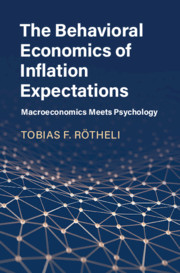Book contents
- The Behavioral Economics of Inflation Expectations
- The Behavioral Economics of Inflation Expectations
- Copyright page
- Dedication
- Contents
- Figures
- Tables
- Preface
- 1 Patterns and Expectations
- 2 Extrapolation and Expectations
- 3 Eliciting Expectations under Laboratory Conditions
- 4 Features of the Laboratory Data
- 5 Similarity Matching and Scaling the Experimental Data
- 6 Pattern Extrapolation and Expectations Measured by Consumer Surveys
- 7 Heterogeneity and Uncertainty of Inflation Expectations
- 8 Inflation Dynamics
- 9 Explaining the Course of Interest Rates
- 10 Generalizing the Pattern-Based Approach
- 11 A Detour to Income Expectations
- 12 The Fisher Effect in Historical Times
- 13 Expectations of High Inflation
- 14 The Fisher Effect in Asian Economies
- 15 The Fisher Effect in African Economies
- 16 Estimates of Expected Inflation for Major Economies
- 17 Estimates of Expected Real Interest Rates for Major Economies
- Epilogue
- References
- Index
15 - The Fisher Effect in African Economies
Published online by Cambridge University Press: 24 July 2020
- The Behavioral Economics of Inflation Expectations
- The Behavioral Economics of Inflation Expectations
- Copyright page
- Dedication
- Contents
- Figures
- Tables
- Preface
- 1 Patterns and Expectations
- 2 Extrapolation and Expectations
- 3 Eliciting Expectations under Laboratory Conditions
- 4 Features of the Laboratory Data
- 5 Similarity Matching and Scaling the Experimental Data
- 6 Pattern Extrapolation and Expectations Measured by Consumer Surveys
- 7 Heterogeneity and Uncertainty of Inflation Expectations
- 8 Inflation Dynamics
- 9 Explaining the Course of Interest Rates
- 10 Generalizing the Pattern-Based Approach
- 11 A Detour to Income Expectations
- 12 The Fisher Effect in Historical Times
- 13 Expectations of High Inflation
- 14 The Fisher Effect in Asian Economies
- 15 The Fisher Effect in African Economies
- 16 Estimates of Expected Inflation for Major Economies
- 17 Estimates of Expected Real Interest Rates for Major Economies
- Epilogue
- References
- Index
Summary
The study of the effect of inflation on the nominal interest rate in African economies has already brought forth a variety of results in the research literature. For one thing, the list of countries to be discussed is rather short. Berument and Jelassi (2002) and Kasman et al. (2006) report statistical evidence for a weak-form Fisher effect for Egypt. Yet, with the interest rate data studied here, the hypothesis under consideration does not gain any support in the case of Egypt. Hence, this country is not treated any further. For Nigeria, Balparda et al. (2017) suggest that the effect under investigation only shows up for very short-term interest rates. For Malawi, Matchaya (2011) indicates that the econometric evidence is consistent with the presence of a Fisher effect. The study of short-term interest rates for Kenya by Caporale and Gil-Alana (2016) does not offer an explicit test of the Fisher hypothesis. Hence, for this country, there exists no previous finding which would permit us to make comparisons. For South Africa, the findings concerning the link between inflation expectations and interest rates are more telling: Phiri and Lusanga (2011) and Kim et al. (2018) document a significant Fisher effect for various nominal interest rates.1
- Type
- Chapter
- Information
- The Behavioral Economics of Inflation ExpectationsMacroeconomics Meets Psychology, pp. 179 - 187Publisher: Cambridge University PressPrint publication year: 2020

